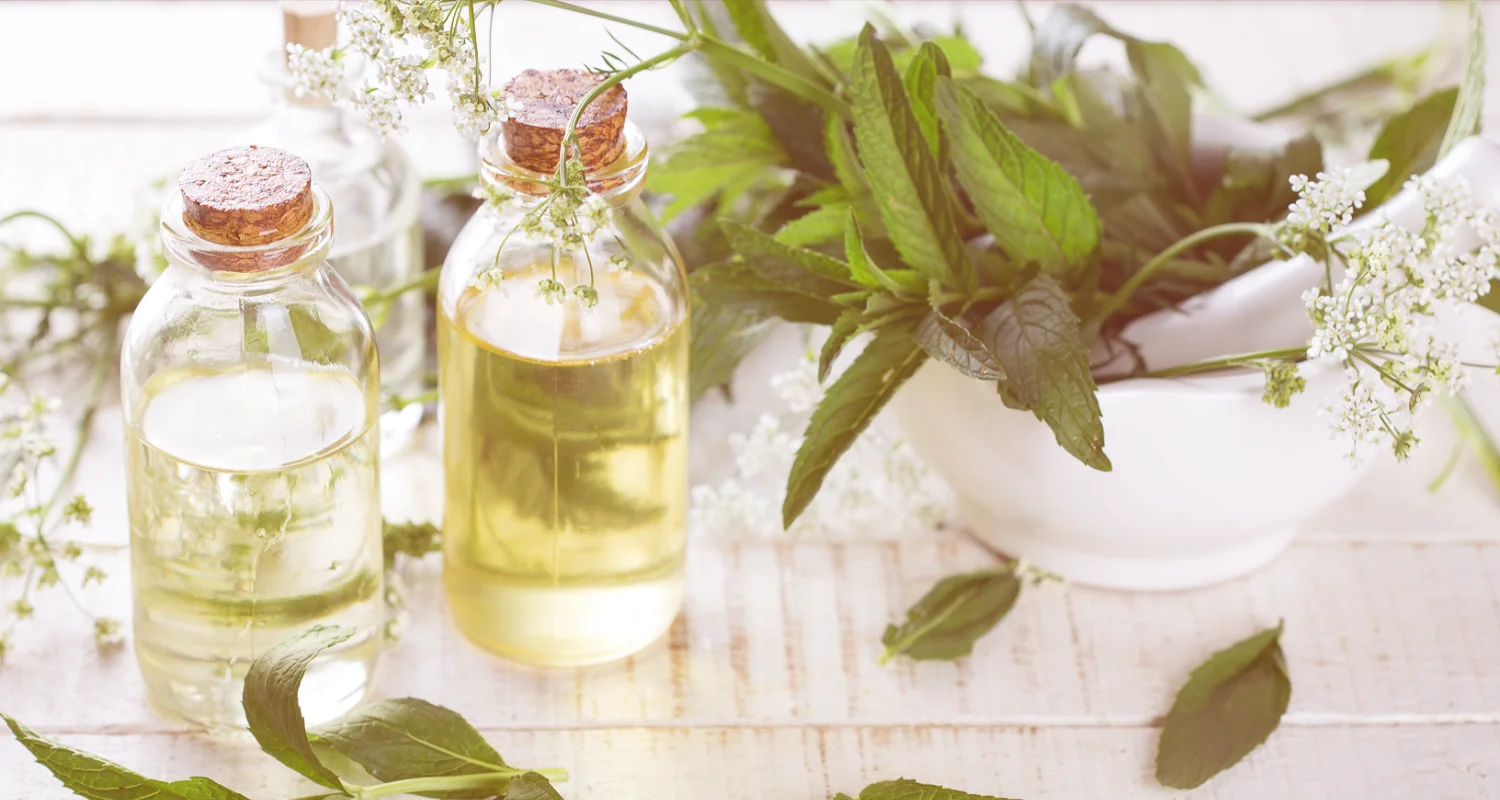Last Updated on: 13th December 2025, 06:33 am
Toothache can be a bothersome and painful experience; it is most often caused by tooth decay, gum infection, or tooth sensitivity. If you have similar concerns about your dental health, it’s essential to schedule a dental appointment.
However, for a quick home remedy and temporary relief, herbal tea is an excellent option. For centuries, people have turned to medicinal herbs, using knowledge drawn from ancient healthcare systems like Ayurveda, Unani, and Siddha.
Herbs have long been cherished for their natural pain-relieving properties, both in medicine and dentistry. Herbal teas for toothaches offer simple yet effective remedies that are easily accessible without requiring a pharmacy visit.
In this article, we will explore what makes herbal tea so effective for easing tooth pain and highlight the specific types that offer the most benefits. Before we dive in, let’s understand the various causes of a toothache.
What causes a toothache?
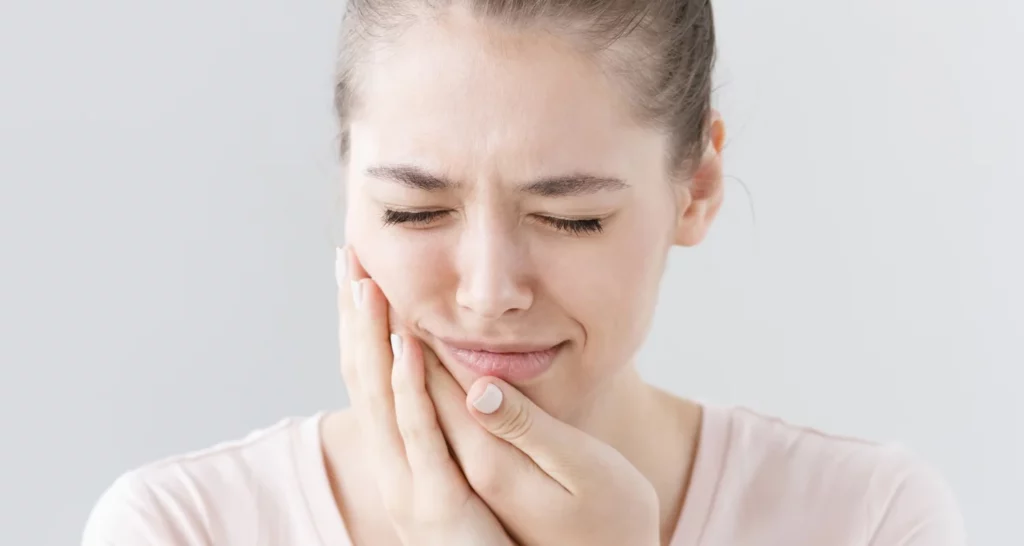
A toothache refers to pain in or around your tooth. There are many reasons people develop tooth pain. They include:
● Cavities
● Infected tooth with abscess
● Cracked tooth
● Damaged dental restoration (like a filling or crown)
● Teeth grinding or clenching (bruxism)
● Gum disease
Dealing promptly with these causes is vital to prevent disease progression. Seeking professional help from a dentist is the wise way to go about it.
However, as mentioned, natural alternatives such as herbal teas serve as an effective solution to provide temporary relief and make the pain significantly better.
Why Choose Herbal Teas for a Toothache?
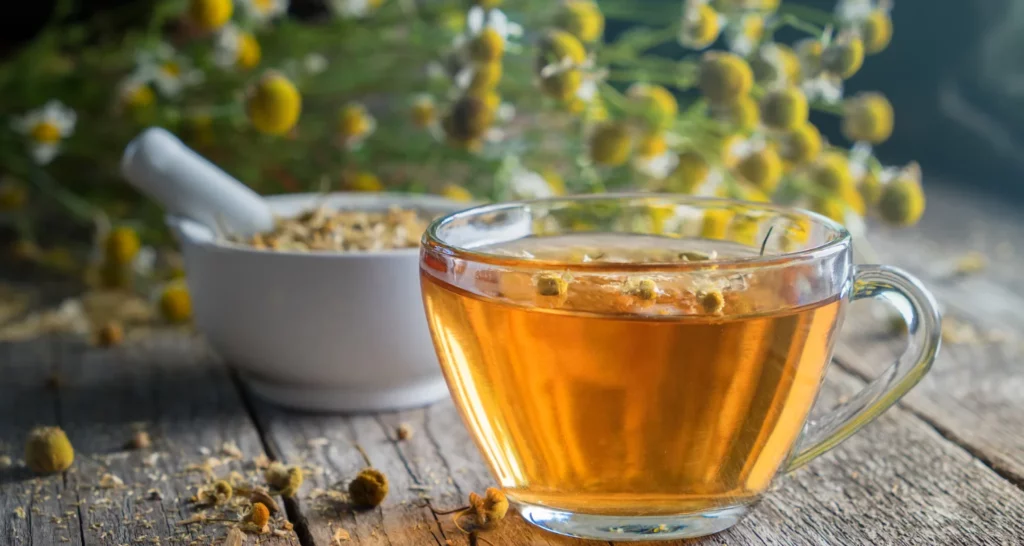
Herbs are staging a promising comeback, having successfully withstood the test of time. Today, herbal products are seen as a symbol of safety in contrast to synthetic products, which are often considered harmful to both humans and Mother Earth.
When it comes to toothaches and overall oral health, herbal teas have proven to be quite effective and popular. They offer natural alternatives to man-made solutions with several benefits such as:
● Natural analgesic properties
● Anti-inflammatory properties
● Natural astringent qualities
● Soothing impact
● Antimicrobial properties
Below you will find popular herbal teas that help relieve toothache symptoms.
Top 5 Herbal Teas for Toothache Relief
The natural properties of tea can help ease toothache and provide temporary relief. A few tea varieties may prove helpful:
● Chamomile tea:
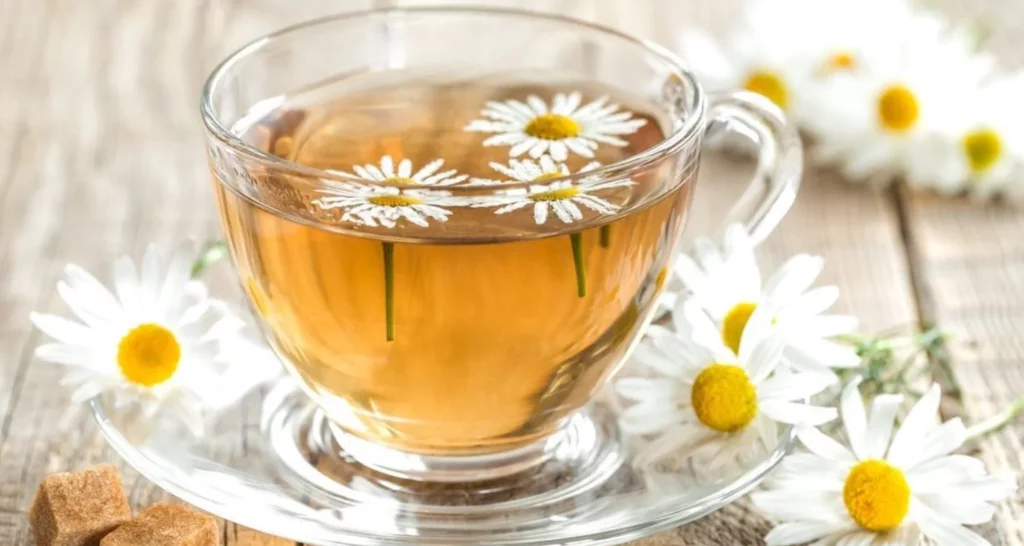
Chamomile tea has anti-inflammatory properties, which can help provide temporary relief from tooth pain. Although drinking chamomile tea offers general health benefits, it might not significantly alleviate toothache pain on its own.
How to use chamomile tea for a toothache:
1. Pour warm water into a cup with a chamomile tea bag, vanilla extract, and lemon juice.
2. Swish the chamomile mouth rinse around your mouth and spit it out after brushing your teeth.
3. Steep 2 tablespoons of chamomile flowers in hot water for 10 minutes to maximize the pain-relieving effects.
For more effective relief, apply chamomile tea bags directly to the affected area of your mouth. This topical application allows the soothing properties of chamomile to directly address the source of discomfort.
Note: Potential side effects of chamomile tea include allergic reactions, nausea, and dizziness. However, when used under the guidance of an oral healthcare professional, these symptoms are unlikely to occur.
● Peppermint tea
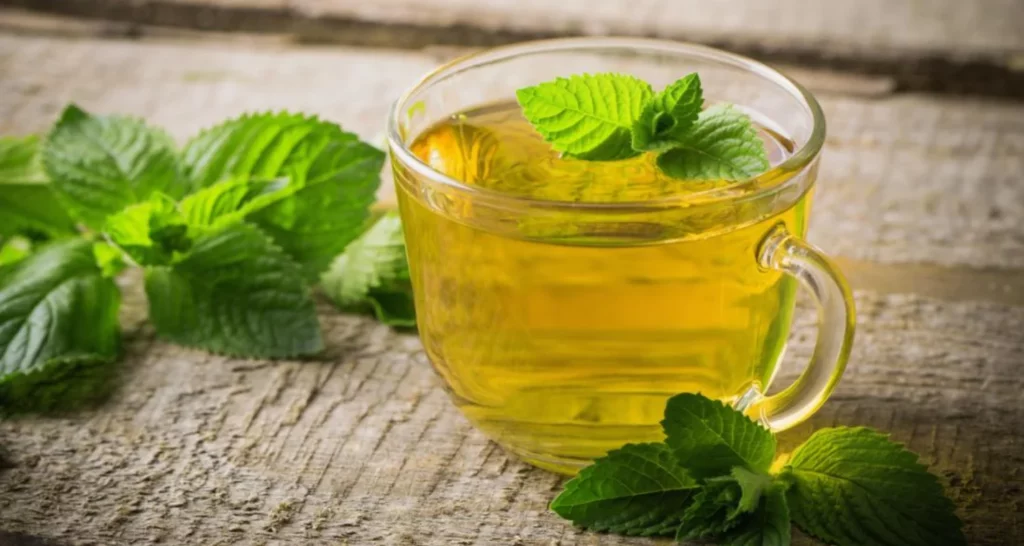
Peppermint tea is a great option for easing toothache, thanks to its natural numbing and cooling effects. The menthol in peppermint provides a soothing sensation that helps relieve pain and reduce inflammation in the affected area. Moreover, peppermint tea has antibacterial properties that might help prevent infections.
Here’s a simple way to use peppermint tea for toothache relief:
1. Prepare the tea: Start by steeping a peppermint tea bag in hot water for 5-10 minutes and cool it after.
2. Apply the tea bag: Place the warm, damp tea bag directly onto the sore tooth or gum. Make sure it is in direct contact with the painful area for the best results.
3. Leave it in place for 5-10 minutes. Discard after use and repeat if needed.
● Clove tea
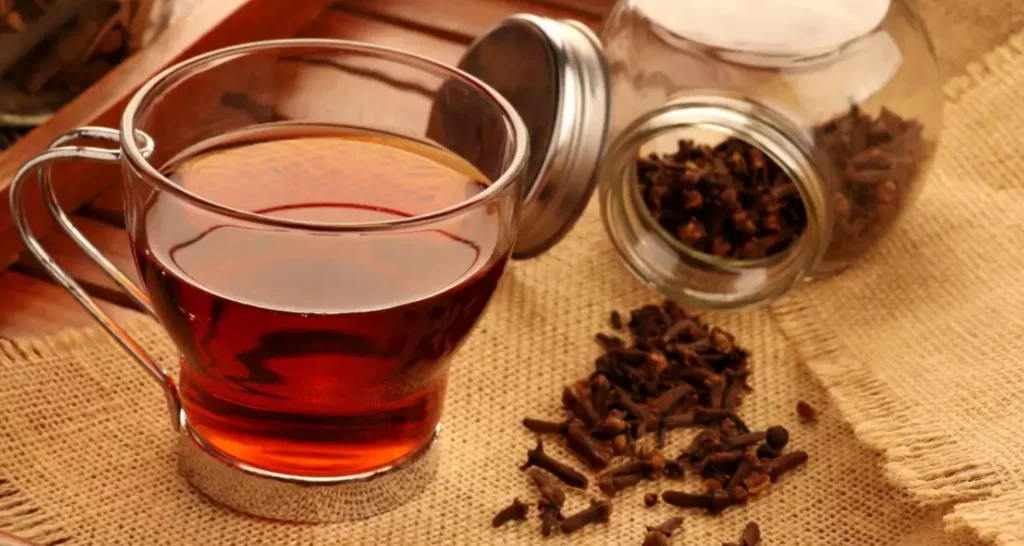
Cloves can be very helpful for toothaches because of their natural pain-relieving, anti-inflammatory, and antibacterial qualities. Their key ingredient, eugenol, helps reduce inflammation, works as a natural anesthetic numbing the area of pain, and fights off bacteria that can cause further dental problems.
How to make clove tea:
1. Prepare the tea: Add 1 glass of water and 1 teaspoon of cloves to a saucepan. Bring it to a boil and let it steep for about 5 minutes until it’s concentrated.
2. Strain and sweeten: Strain the liquid, then stir in 1 teaspoon of honey.
3. Drink warm: Enjoy your tea while it’s still warm.
Note: Be careful not to over consume clove tea. Cloves have natural anticoagulant properties, which can thin the blood. If you have a condition that affects blood thickness or are on blood-thinning medication, avoid this tea to prevent any potential complications. 1-2 cups daily is a fairly good amount.
● Green tea
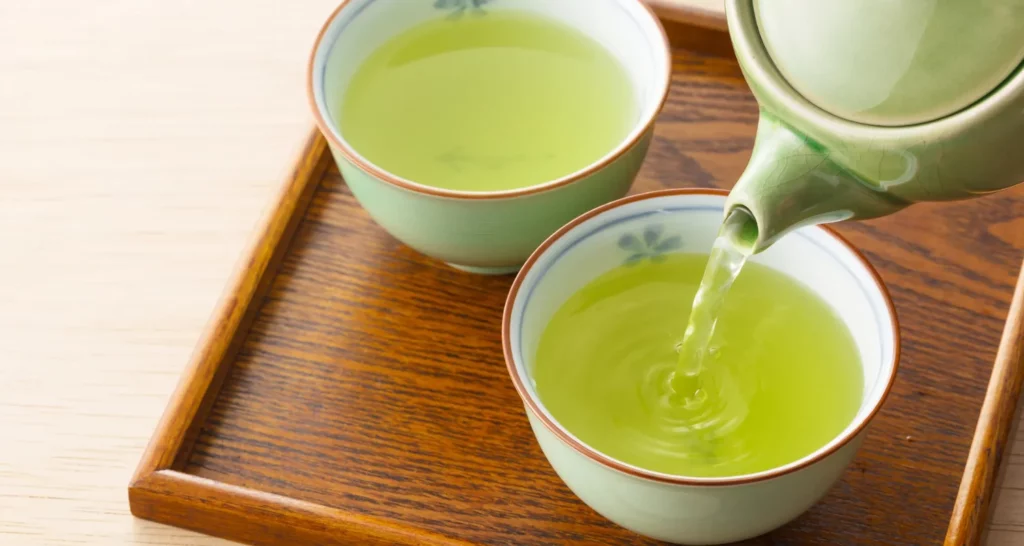
Green tea is great for more than just a refreshing drink—it can also soothe a toothache. The tannins it contains have potent anti-inflammatory properties, while its catechins act as antioxidants that fight bacteria and support healing.
A simple way to use green tea for toothache relief:
1. Brew a cup of green tea and let it steep for 3-5 minutes.
2. Let the tea cool to a lukewarm temperature so it doesn’t burn.
3. Swish the cooled tea around your mouth for 30 seconds, making sure it touches the sore area. Spit out the tea and repeat 2-3 times.
4. For extra relief, you can also place a used tea bag on the sore spot for a few minutes. Do this 2-3 times a day or as needed until the pain eases.
● Ginger tea
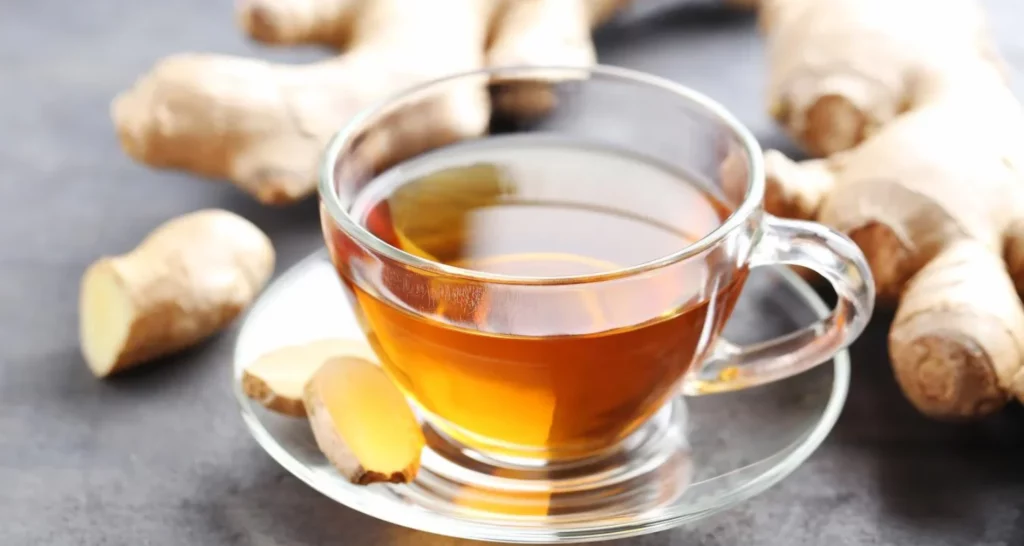
Ginger tea is a great choice for easing toothache pain, thanks to its powerful anti-inflammatory and pain-relieving properties. The active compound, gingerol, helps reduce both pain and inflammation in the affected area.
For the best results, use ginger tea topically: steep a ginger tea bag in hot water for a few minutes, let it cool to a warm temperature, and then squeeze out any excess water. Place the warm tea bag directly on the sore spot in your mouth for 10-15 minutes to help soothe the pain. You can repeat this as needed to find relief.
Note: If you have severe pain lasting a few days, swelling, fever, visible damage to your tooth, or trouble swallowing, natural remedies might not be enough. In such situations, it would be best to visit your nearest dental office for a consultation to get the care you need.
Toothaches can be quite uncomfortable; they are caused by various dental issues. While professional dental care is crucial, herbal teas can provide temporary relief. Their pain-relieving, anti-inflammatory, and antibacterial properties help ease any discomfort. However, it is important to understand that they only address the symptoms and aren’t a substitute for professional treatment that targets the root cause.
Frequently Asked Questions
Which herbal tea is good for teeth?
The natural properties of tea can help ease toothache and provide temporary relief. A few tea varieties may prove helpful:
- Chamomile tea.
- Peppermint tea.
- Clove tea.
- Green tea.
- Ginger tea.
What is the remedy for a toothache?
Herbs are staging a promising comeback, having successfully withstood the test of time. Today, herbal products are seen as a symbol of safety in contrast to synthetic products. When it comes to toothaches and overall oral health, herbal teas have proven to be quite effective and popular. They offer natural alternatives to man-made solutions with several benefits such as:
- Natural analgesic properties.
- Anti-inflammatory properties.
- Natural astringent qualities.
- Soothing impact.
- Antimicrobial properties.
How do I reduce toothache?
To reduce toothache, you can resort to the use of the natural properties of tea that help relieve toothache pain and provide temporary relief. Some varieties of tea may be helpful:
- Chamomile tea.
- Peppermint tea.
- Clove tea.
- Green tea.
- Ginger tea.
Does green tea help clean or harm your teeth in any way?
Green tea is great for more than just a refreshing drink; it can also soothe a toothache. The tannins it contains have potent anti-inflammatory properties, while its catechins act as antioxidants that fight bacteria and support healing.
Share
References
1. Abbasi, Fatemeh & Khazaei, Salman & Ahmadi-Motamayel, Fatemeh. (2023). Evaluation of pharmaceutical use of chamomile in dentistry: A systematic review. Journal of Craniomaxillofacial Research. 10.18502/jcr.v9i3.12693
2. Kumar, G., Jalaluddin, M., Rout, P., Mohanty, R., & Dileep, C. L. (2013). Emerging trends of herbal care in dentistry. Journal of clinical and diagnostic research : JCDR, 7(8), 1827–1829. https://doi.org/10.7860/JCDR/2013/6339.3282
3. Cathy W. (Jan, 2024) 18 At-Home Remedies for Toothache Pain. Verywellhealth. https://www.verywellhealth.com/natural-remedies-for-toothache-89359
4. Cara M. (Jan, 2021). 5 Natural homemade clove remedies for toothache. Medicine.com. https://www.medicine.com/health/5-natural-homemade-clove-remedies-toothache
5. Melisa G. (Mar, 2023). 12 Science-Backed Benefits of Peppermint Tea and Extracts. Healthline. https://www.healthline.com/nutrition/peppermint-tea
-
Nayibe Cubillos M. [Author]
Pharmaceutical Chemestry |Pharmaceutical Process Management | Pharmaceutical Care | Pharmaceutical Services Audit | Pharmaceutical Services Process Consulting | Content Project Manager | SEO Knowledge | Content Writer | Leadership | Scrum Master
View all posts
A healthcare writer with a solid background in pharmaceutical chemistry and a thorough understanding of Colombian regulatory processes and comprehensive sector management, she has significant experience coordinating and leading multidisciplina...Recent Posts


